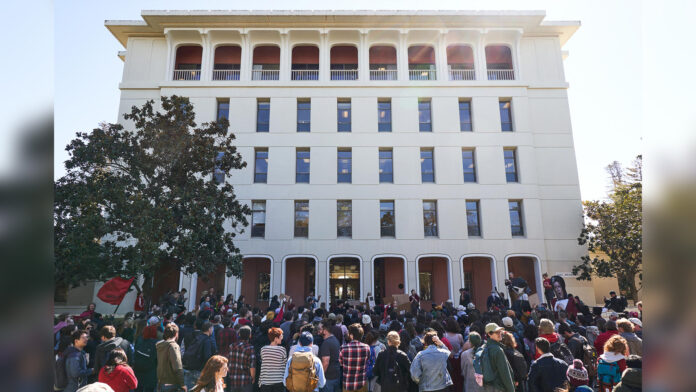Strikes and protests reflect discontent with handling of COVID-19 measures
Cost of Living Adjustment (COLA) movements from seven UCs, including UC Davis, went on strike on May 1, International Workers’ Day, withholding labor and organizing car rallies in their respective neighborhoods.
According to a joint press release from COLA movements UC-wide, the actions were a call for full investment in universities, public education and public services.
“Not one dollar cut, not one layoff, not one life lost,” the statement reads. “The months-long fight for a COLA has sought to highlight a fundamental, structural hypocrisy of the UC system: Despite sitting on billions of dollars, the UC does not think its graduate student workers deserve a living wage and financial security when it accepts them into their ‘world-renowned’ programs.”
In the press release, COLA organizers called for the UC to give graduate students guaranteed summer funding, extend time to degree and funding packages by a year and drop non-resident supplemental tuition for international graduate students.
Anthony LaBarbera, a first-year graduate student at UC Davis, said in a previous interview with The California Aggie that he hadn’t yet started his research when the pandemic began.
“We can really just focus on our research,” LaBarbera said about summertime, adding that he’s not “too worried” about his timeline being pushed unless summer began and he still couldn’t go into lab — at that point, he explained, he’d be thrown off “about a year.”
Though there’s a possibility that UC Davis Summer Session II lab courses may be online, both Summer Sessions I and II will be administered through remote instruction. Currently, only research related to COVID-19 is being conducted on campus.
These changes motivated other UC Davis graduate students to circulate a petition calling for similar concessions, laid out in demands included in the COLA organizers’ press release, from UC Davis’ Office of Graduate Studies.
The Aggie reached out to the UC Office of the President for comment regarding graduate educational changes. UCOP did not send a response before this article went to press.
COLA movements were among the more than 80 graduate and university labor organizations that took part in May Day actions on May 1, International Workers’ Day.
UC Academic Federation of Teachers (AFT), a union representing lecturers and librarians across the UC, was one such organization. UC-AFT put an online picket on its website featuring allies and UC-AFT workers sharing how layoffs would impact them.
As of Jan. 31, UC-AFT lecturers are without a contract.
John Rundin, a lecturer teaching ancient Greek and Latin at UC Davis and the former president for UC-AFT Local 2023, said on the online picket that if all lecturers in his program were laid off, the discipline could be killed.
Rundin, who has spent 19 years teaching for the UC, also said a layoff on June 30 would be “very sad,” given how close he was to retirement.
“A layoff would damage my retirement severely […] and my partner of decades and I would lose good medical benefits,” he said. “We need those for my partner’s arthritis.”
Another post on the online picket, sent in by Nora, a third-year undergraduate at UC Davis whose last name was withheld, called for the university to be more transparent about where tuition money is going — which will not decrease whether or not instruction is remote.
“The school states lengthy and quite unproductive emails [about] how they will continue to support the community, yet they decide they will lay-off amazing lecturers who provide so much to the university,” she wrote.
The most recent bargaining session UC-AFT had with the UC was on March 21.
Other May Day actions occurred nationwide, with workers from FedEx, Instacart, Target, Amazon, Walmart and Trader Joe’s striking for hazard pay, stricter social distancing and cleaning measures and greater sick-leave policies.
In multiple press releases, all of the aforementioned companies have affirmed their commitment to workers’ safety, citing measures they have taken to acquire protective equipment for workers and lay out social distancing guidelines in stores.
Workers, however, disagree. One of the organizers of the May Day actions, Willy Solis, said in an interview with The Washington Post that Target is not following through on its commitments.
“In reality, only a very small portion of people received [PPE],” he said.
Meanwhile, protestors unsatisfied with Gov. Gavin Newsom’s shelter-in-place orders headed to Huntington Beach, with The Guardian reporting that nearly 3,000 people protested there. At the State Capitol, where The Sacramento Bee said roughly 1,000 came to protest, 32 protesters were arrested.
These actions underscore the increasing frustration and dissatisfaction at changes the pandemic has caused and, according to COLA organizers, the hypocrisy of larger institutions.
While the COLA movement has been building since last November, the car rallies on Friday happened in the wake of UC Santa Cruz COLA organizers announcing on April 27 that they planned to submit Fall and Winter Quarter grades that were initially withheld as part of the COLA movement.
“By submitting the grades we have carried through our struggle, we ensure that our students receive the grades they earned despite the administration’s continued indifference towards undergraduate education,” the statement reads.
Organizers also said in the statement that building toward an Unfair Labor Practice (ULP) strike — a strike sanctioned by UC graduate students’ union, United Auto Workers (UAW) 2865 — represents the strongest path to fired graduate student instructors’ reinstatement, with the UAW-2865 proposed contract also calling for a salary raise to $40,000 a year for all graduate students.
UAW-2865, which announced it would hold an ULP strike vote in early April, is pushing for 5,000 union member pledges before it calls the vote. There are currently over 2,300 union members who have pledged to vote in favor of authorizing the strike.
Written by: Janelle Marie Salanga — campus@theaggie.org









